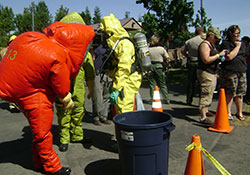IHR: A framework to protect people from health emergencies

Dee Grimm
The International Health Regulations (IHR) (2005) play a key role in shaping the way the world prepares for and responds to emergencies. An international legal instrument, IHR (2005) provides a unique global framework to protect people from health emergencies of any type, whereby its 196 States Parties commit to reporting public health emergencies of international concern and to strengthening national preparedness and response systems.
In the words of the IHR, the scope is:
to prevent, protect against, control and provide a public health response to the international spread of disease in ways that are commensurate with and restricted to public health risks, and which avoid unnecessary interference with international traffic and trade.
The IHR (2005) are central within the WHO Health Emergencies Programme (WHE) to guide countries towards achieving common approaches and capacity standards. WHO supports countries to monitor, evaluate, strengthen and test their core capacities to cope with crises.
In the WHO Regional Office for Europe, a great deal of work focuses on the interlinkage between health emergencies and health systems. By strengthening the core capacities of the IHR (2005), countries are improving their health system resilience. Equally, development of responsive health systems is an integral part of IHR (2005) implementation. This virtuous circle means countries can continually “build back better” as they prevent, prepare, respond to and recover from emergencies.
WHO/Europe is focusing on priority countries to support improvement of their IHR capacities and health system strengthening. This is part of WHO’s stated aim of protecting a billion additional people from health emergencies and thereby progressing towards key targets including the Sustainable Development Goals (SDGs), as well as G7 and G20 commitments.



